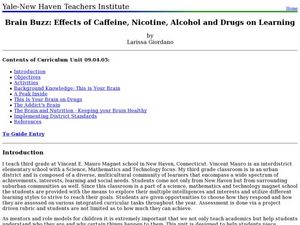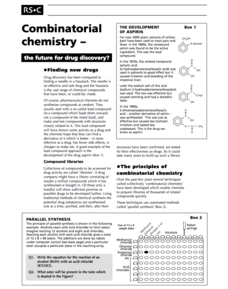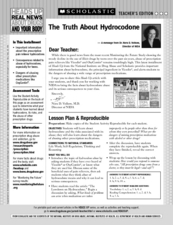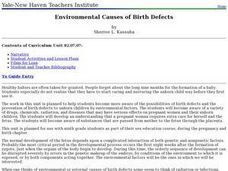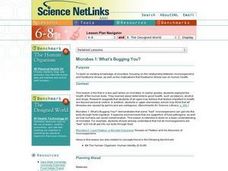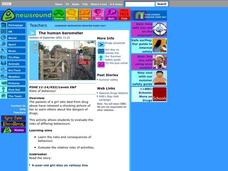National Institute on Drug Abuse
The Brain's Response to Drugs
Marijuana affects the brain differently than inhalants, which have a different effect than opioids. Elementary and middle school classes read about these drugs as well as nicotine, methamphetamine, hallucinogens, and steroids before...
Curated OER
Drugs Can Be Good and Bad
How can you tell which drugs are helpful, and which drugs are harmful? Use a health learning exercise in your kindergarten class to determine which drugs can make you healthy. They choose from a group of pictures that includes cough...
Curated OER
Good Drugs, Bad Drugs
Add a science experiment on medicine and drugs to your health lesson. After reading a paragraph on the difference between helpful and harmful drugs, kids choose which pictures of bottles they could find at a pharmacy. The last activity...
PBS
Stories of Painkiller Addiction: The Cycle of Addiction
Drug addiction, including prescription drug addiction, begins with a reason that's different for every user. High schoolers learn more about the reasons people begin abusing drugs with a set of videos and worksheets that discuss four...
Curated OER
Skin: The Behavior and Health Connection
Young scholars explore how personal behavior can affect health, especially the health of your skin. They become better aware of how their personal behavior and the environment can have a considerable impact on their health in general....
Curated OER
Drugs Change the Way Neurons Communicate
Students examine that certain drugs interfere selectively with neurotransmission, and realize that the effect of a drug is dependent upon dosage and route of administration.
PBS
Stories of Painkiller Addiction: Contemplating Nature vs. Nurture
Does having an addict in your family make it more likely to become one yourself? Explore the genetic risk factors, as well as the prominent environmental influences, for substance addiction in a instructional activity that encourages...
Curated OER
Brain Buzz: Effects of Caffeine, Nicotine, Alcohol and Drugs on Learning
Students understand how the brain functions and how they can promote a healthy lifestyle. In this health lesson students complete several activities including investigating how stimulates affect the brain.
Steered Straight
Marijuana Awareness
February is Marijuana Awareness Month, and a set of interdisciplinary activities can make your class aware of the social, medical, legal, and psychological effects of marijuana. With writing prompts, research opportunities, and...
PBS
Stories of Painkiller Addiction: Commitment to Recovery
Recovery from substance addiction is an ongoing process. The final lesson plan in a series about painkiller abuse and addiction prompts learners to research various recovery options before writing a short story about a character who is...
Curated OER
One Sniff Can Kill!
Students investigate the question: In what ways can a common household products hurt you? This lesson integrates with drug and alcohol units in science classes as well as language arts in the form of the Public Service Announcement...
Curated OER
Heart 2: Changing Lifestyles and Heart Health
Students examine and evaluate changes in diet and lifestyle from prehistoric to modern times and how these differences have spurred the development (and better treatment) of heart disease.
Royal Society of Chemistry
Combinatorial Chemistry—Chemistry Now
Finding new drugs has been likened to finding a needle in a haystack. How do pharmaceutical companies do it? One of a small series of four informative leaflets examines combinatorial chemistry, the method at the forefront of new drug...
NOAA
Watch the Screen!
Can a sponge cure cancer? Life science pupils visit the drugstore under the sea in the fifth lesson of six. Working groups research the topic then get hands-on experience by testing the inhibiting effects of several plant extracts on E....
Curated OER
Facts into Action
Learners role play chosen scenario about smart decision making. For this drug awareness lesson, students discuss the danger associated with drug abuse. They practice how to make careful choices when faced with a difficult situation.
Curated OER
The Truth About Hydrocodone
Learners explain the beneficial uses of pain relievers. In this health science instructional activity, students discuss the harmful effects of prescription drug abuse. They complete a worksheet at the end of the instructional activity.
Curated OER
Simulating the Spread of an Infectious Disease
In this health worksheet, students identify various infectious diseases and explore the available options for stopping or preventing the spread of disease. They participate in a simulation experiment on how to measure and prevent. There...
Curated OER
Environmental Causes of Birth Defects
Get your high schoolers thinking about the factors that lead to birth defects. They examine how environmental factors and personal choices can cause birth defects in unborn children. They discover the effects of various handicaps such as...
Curated OER
MICROBES 1: WHAT'S BUGGIN YOU?
Young scholars use existing knowledge of microbes, focusing on the relationship between microorganisms and foodborne illness, as well as the implications that foodborne illness has on human health.
Curated OER
Microbes: Louis Pasteur - A Microbe Discoverer
Students study Louis Pasteur and the process of pasteurization in controlling microbes. In this pasteurization lesson, students discuss microorganisms and how they can affect health. They discuss Louis Pasteur and research his work by...
Curated OER
Biology: Humans as Organisms
Students examine body systems. In this biology lesson, students explore the roles of different body systems and discover the effects of smoking, drugs, alcohol, exercise, and good nutrition on human body systems.
Curated OER
Microbes 1: What's Bugging You?
Middle schoolers build on existing knowledge of microbes, focusing on the relationship between microorganisms and foodborne illness, as well as the implications that foodborne illness has on human health.
Curated OER
The human barometer
Students read the story: 9-year-old girl dies on railway line. They engage in the 'Human Barometer': Collect a range of names of dangerous activities from the class. For example: skateboarding, waterskiing, bungee jumping, climbing,...
Curated OER
Teen and Decision Making
Students examine how the brain develops. In this neurology lesson students read an article citing evidence that the different areas of the brain mature at different rates. They discuss emotional versus logical aspects of decision-making....
Other popular searches
- Health Safety Alcohol Drugs
- Health, Alcohol and Drugs
- Alcohol Drugs Health
- Health Alcohol and Drugs
- Health\, Alcohol and Drugs
- Health\\, Alcohol and Drugs









